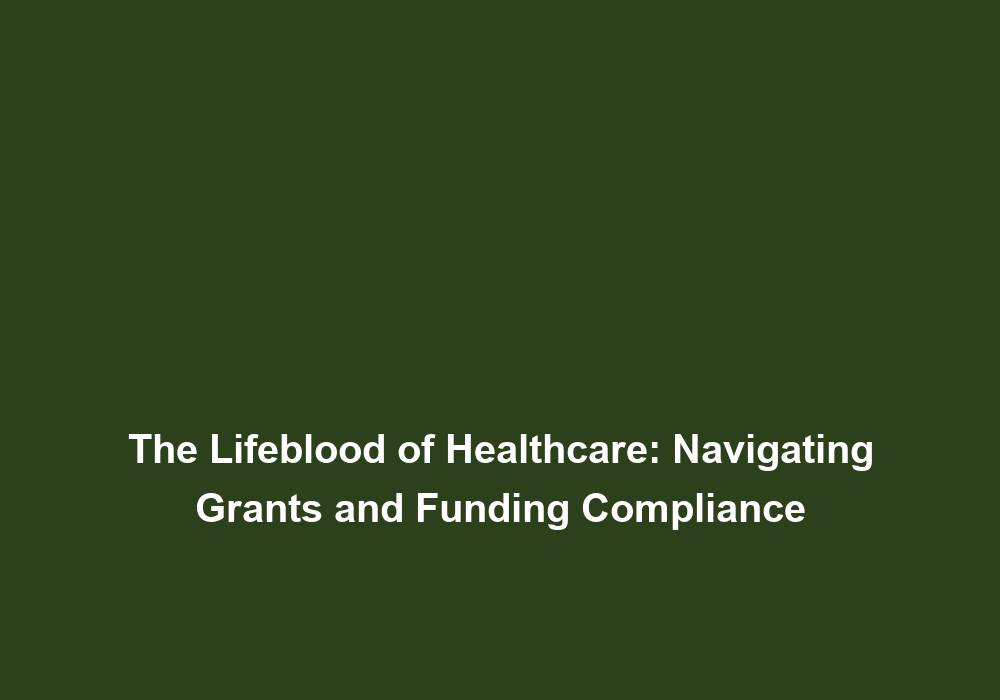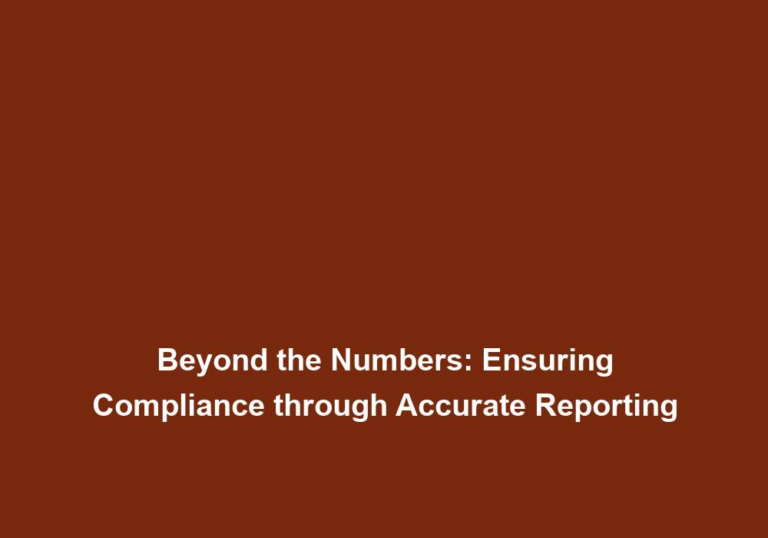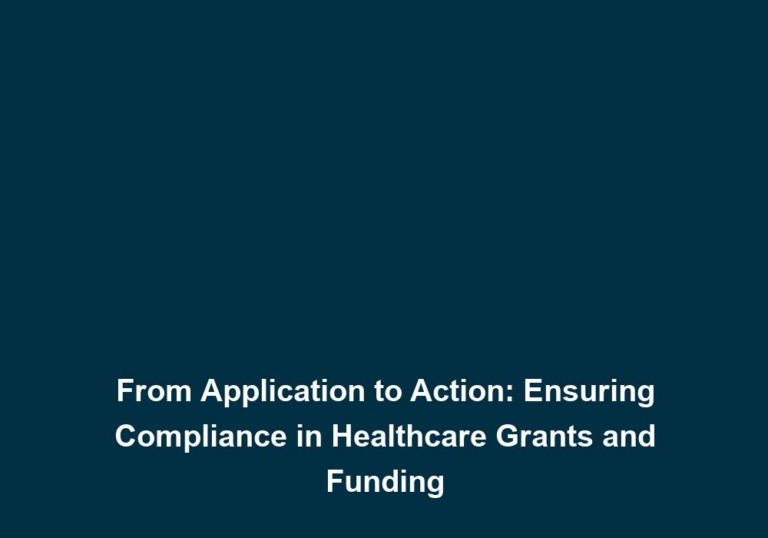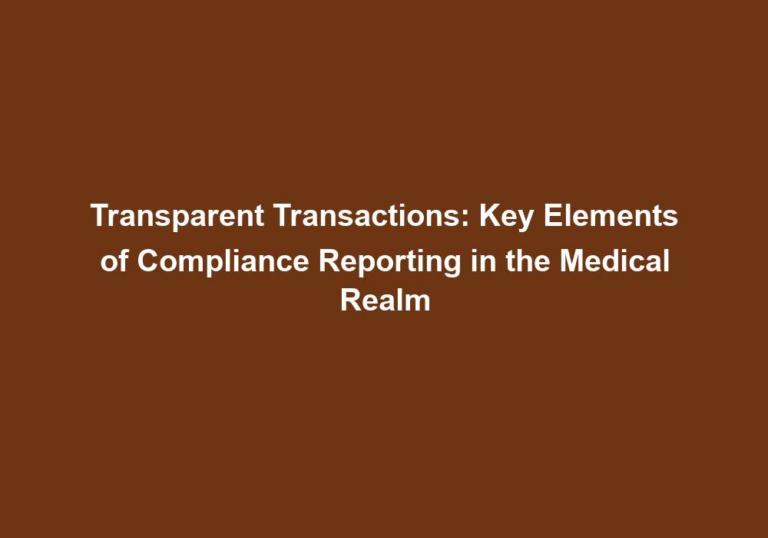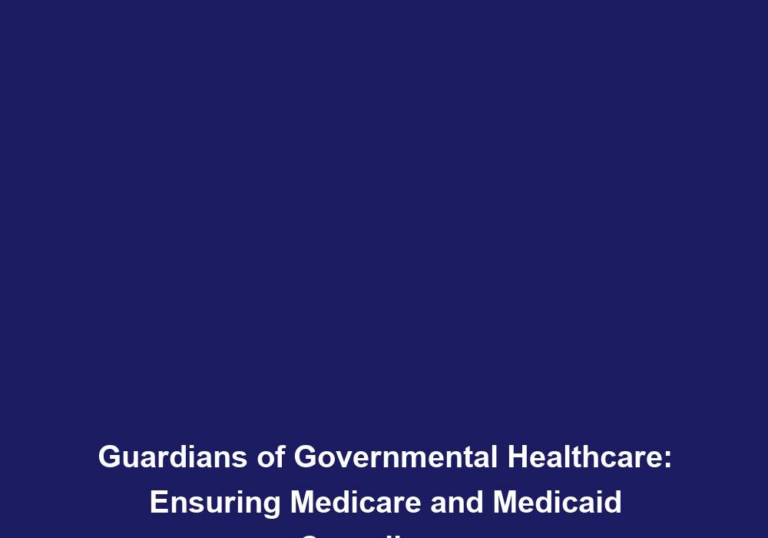The Lifeblood of Healthcare: Navigating Grants and Funding Compliance
In the ever-evolving field of healthcare, grants and funding play a crucial role in supporting the development and delivery of essential services. These financial resources act as the lifeblood of healthcare organizations, enabling them to enhance patient care, conduct research, invest in new technologies, and address community needs. However, navigating the complexities of grants and funding compliance can be a daunting task. This article aims to shed light on the importance of grants and funding in healthcare and provide insights into effectively managing compliance requirements.
Understanding the Significance of Grants and Funding in Healthcare
Grants and funding are integral to the sustainability and growth of healthcare organizations. They provide financial support for various initiatives, including infrastructure development, research projects, medical equipment procurement, workforce training, and community healthcare programs. Without adequate funding, healthcare institutions would struggle to provide quality care and innovations that improve patient outcomes.
The Impact on Patient Care
Grants and funding have a direct impact on patient care by enabling healthcare facilities to upgrade their infrastructure and invest in state-of-the-art medical equipment. For example, grants can help hospitals acquire cutting-edge diagnostic tools, such as MRI machines or robotic surgery systems, which enhance diagnostic accuracy and treatment efficacy. Additionally, funding can support the hiring and training of specialized healthcare professionals, ensuring that patients receive the highest level of care.
Expanding on the impact on patient care, grants and funding also enable healthcare organizations to implement patient-centered initiatives. With sufficient financial resources, hospitals and clinics can improve patient satisfaction by enhancing the overall healthcare experience. This can include initiatives such as reducing wait times, implementing electronic medical records systems for seamless information sharing, and establishing patient support programs to address their specific needs.
Furthermore, grants and funding can play a crucial role in improving healthcare outcomes for specific patient populations. For instance, funding can be used to support research and interventions aimed at reducing health disparities among marginalized communities. By investing in targeted programs and services, healthcare organizations can ensure that all patients, regardless of their socio-economic background, receive equitable and high-quality care.
Driving Innovation and Research
Grants and funding are essential for fostering innovation and advancing medical research. They provide resources for scientists, physicians, and healthcare professionals to explore novel treatments, develop new drugs, and conduct clinical trials. These endeavors not only contribute to medical breakthroughs but also lead to the discovery of more cost-effective and efficient healthcare solutions. Furthermore, grants often require organizations to collaborate with academic institutions and industry partners, fostering a culture of innovation and knowledge-sharing.
Expanding on driving innovation and research, grants and funding play a vital role in supporting interdisciplinary research collaborations. In the healthcare field, many complex problems require a multidisciplinary approach for effective solutions. By providing funding for collaborative research projects, grants enable experts from different fields to come together and share their knowledge and expertise. This not only accelerates the pace of discovery but also enhances the quality and impact of research outcomes.
Moreover, grants and funding can also support the development and implementation of innovative technologies in healthcare. From telemedicine platforms that enable remote patient consultations to artificial intelligence systems that assist in diagnosis, funding plays a pivotal role in bringing these advancements to the forefront of patient care. By investing in technology-driven solutions, healthcare organizations can improve efficiency, accuracy, and accessibility of healthcare services, ultimately benefiting both patients and healthcare providers.
Addressing Community Needs
Healthcare organizations have a responsibility to address the unique needs of their communities. Grants and funding play a pivotal role in supporting community healthcare programs, particularly in underserved areas. These initiatives can include preventive care campaigns, health education programs, and access to primary healthcare services for vulnerable populations. Grants can also fund initiatives focused on reducing health disparities, such as improving maternal and child health outcomes or addressing mental health challenges.
Expanding on addressing community needs, grants and funding can contribute to the development of comprehensive healthcare systems that cater to the specific requirements of different communities. For example, in rural areas where access to healthcare services may be limited, grants can support the establishment of mobile clinics or telehealth programs to ensure that individuals living in remote locations have access to timely and quality care. Additionally, funding can be allocated to community health centers that provide essential services, such as vaccinations, screenings, and preventive care, to underserved populations.
Furthermore, grants and funding can enable healthcare organizations to collaborate with community-based organizations and local stakeholders to identify and address the unique healthcare needs of their communities. This collaborative approach ensures that healthcare interventions are culturally sensitive, responsive, and effective in meeting the diverse needs of the population. By investing in community-driven initiatives, healthcare organizations can contribute to improving the overall health and well-being of the communities they serve.
Navigating Grants and Funding Compliance
While grants and funding offer immense opportunities, healthcare organizations must navigate a complex landscape of compliance requirements to ensure transparency, accountability, and ethical practices. Failing to meet compliance standards can lead to financial penalties, reputational damage, and the loss of future funding opportunities. Here are some key considerations for effectively managing grants and funding compliance:
1. Understanding Funding Sources and Guidelines
Each grant or funding opportunity comes with specific guidelines and criteria. It is essential to thoroughly review the funding source’s requirements, eligibility criteria, and application process. Familiarize yourself with the funding agency’s mission, goals, and priorities to align your proposals and initiatives accordingly. Failure to adhere to these guidelines may result in disqualification or rejection of your application.
Expanding on understanding funding sources and guidelines, it is crucial to conduct thorough research on potential funding opportunities. Explore various sources, such as government agencies, private foundations, and corporate grants, to identify suitable options for your healthcare organization. By understanding the specific requirements and priorities of each funding source, you can tailor your proposals and increase the likelihood of securing funding. Additionally, staying updated on funding opportunities and subscribing to relevant newsletters or alerts can ensure that you don’t miss out on potential funding sources.
2. Developing Strong Grant Proposals
Crafting a compelling grant proposal is crucial for securing funding. Clearly articulate the problem you aim to address, your proposed solution, and the expected outcomes. Ensure that your proposal aligns with the funding agency’s priorities and clearly outlines how the resources will be utilized. Collaborating with grant writing experts and subject matter specialists can significantly enhance the quality and competitiveness of your proposals.
Expanding on developing strong grant proposals, it is essential to highlight the potential impact and value of your proposed initiatives. Clearly outline the expected outcomes and how they align with the funder’s goals. Additionally, provide a detailed budget that demonstrates a clear plan for resource allocation and ensures that the funds will be used efficiently and effectively. Consider including a timeline or project plan to showcase the implementation process and milestones. By presenting a well-structured and compelling grant proposal, you increase your chances of securing funding for your healthcare organization.
3. Establishing Robust Financial Management Systems
Sound financial management is essential for grants and funding compliance. Establishing robust internal controls, accounting practices, and reporting mechanisms ensures that funds are utilized appropriately and transparently. Implementing effective budgeting and tracking systems allows organizations to monitor expenses, avoid overspending, and demonstrate financial accountability to funding agencies.
Expanding on establishing robust financial management systems, it is crucial to develop clear financial policies and procedures that align with grant requirements and regulatory standards. This includes documenting guidelines for expense tracking, reimbursement procedures, and financial reporting. By establishing comprehensive financial management systems, healthcare organizations can ensure compliance with funding regulations, minimize the risk of financial mismanagement, and maintain the trust and confidence of funding agencies.
4. Maintaining Accurate Record-Keeping
Maintaining accurate and up-to-date records is vital for grants and funding compliance. Organize all relevant documents, including grant agreements, financial reports, progress updates, and audit records, in a centralized and easily accessible system. This ensures that information can be readily retrieved during audits or when reporting to funding agencies. Additionally, proper record-keeping facilitates efficient grant management and helps organizations meet reporting deadlines.
Expanding on maintaining accurate record-keeping, it is essential to establish a standardized documentation system that includes both physical and digital records. This system should include a clear naming convention, folder structure, and version control to ensure easy retrieval and tracking of documents. Regularly update and maintain the documentation system to reflect any changes or updates in grant requirements or reporting guidelines. By maintaining accurate and organized records, healthcare organizations can streamline the compliance process, mitigate the risk of errors or omissions, and demonstrate transparency and accountability to funding agencies.
5. Investing in Compliance Training and Expertise
Staying up-to-date with evolving compliance regulations is crucial for healthcare organizations. Invest in regular compliance training for staff members involved in grant management and financial administration. Engaging compliance experts or consultants can provide valuable insights and ensure adherence to changing legal requirements. Proactively monitoring compliance updates and seeking professional guidance can mitigate compliance risks and help maintain a strong reputation.
Expanding on investing in compliance training and expertise, it is important to provide comprehensive training programs for staff members involved in managing grants and funding. This training should cover topics such as grant compliance regulations, financial management best practices, reporting requirements, and ethical considerations. Additionally, consider establishing a compliance committee or appointing a compliance officer within your organization to oversee ongoing compliance efforts and serve as a point of contact for staff members. By investing in compliance training and expertise, healthcare organizations can proactively address compliance challenges, promote a culture of ethical behavior, and ensure the long-term sustainability of grant-funded initiatives.
6. Demonstrating Impact and Accountability
Funding agencies expect quantifiable results and impact assessments. Regularly evaluate and measure the outcomes of your funded initiatives, documenting the impact on patient care, research advancements, or community health outcomes. By demonstrating accountability and positive outcomes, healthcare organizations can enhance their credibility and increase their chances of securing future funding opportunities.
Expanding on demonstrating impact and accountability, it is essential to establish a robust evaluation and monitoring system to measure the outcomes and impact of grant-funded initiatives. This can include collecting and analyzing data on patient outcomes, research findings, community health indicators, and other relevant metrics. Regularly communicate and share these findings with funding agencies through progress reports, impact assessments, and success stories. By demonstrating the tangible results and value of grant-funded projects, healthcare organizations can build strong relationships with funding agencies, attract additional funding, and contribute to the overall improvement of healthcare services.
In conclusion, grants and funding are the lifeblood of healthcare organizations, driving innovation, supporting patient care, and addressing community needs. Navigating the complexities of grants and funding compliance requires a thorough understanding of funding sources, strong grant proposal development, robust financial management systems, accurate record-keeping, compliance expertise, and a commitment to demonstrating impact and accountability. By effectively managing grants and funding compliance, healthcare organizations can ensure the continued availability of resources necessary for delivering high-quality care and driving advancements in the field.

